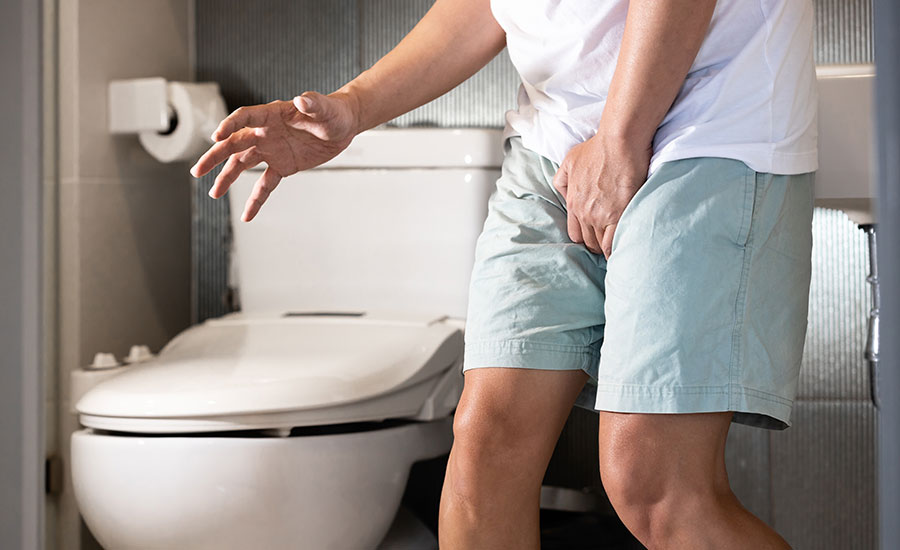UTI in the Elderly: Symptoms, Common First Signs & Tips

Have you noticed your elderly loved one seeming more confused or complaining of a burning sensation while urinating?
These may be signs of a urinary tract infection (UTI), which is common in older adults.
While urinary tract infections are often mild, they can be challenging to diagnose in seniors, leading to continuous discomfort or overall poor health.
We’ll explain what a urinary tract infection is, cover common symptoms in the elderly, share how to help them manage discomfort, and more.
Plus, if you’re worried about mom, dad, grandpa, or grandma experiencing an infection, we’re here to help by providing personalized in-home care and ongoing support to manage their symptoms.
Table of Contents
What Is a Urinary Tract Infection (UTI)?
A urinary tract infection (UTI) occurs when bacteria or fungus infects any part of the urinary system, including the kidneys, bladder, ureters, and urethra.
However, most UTIs primarily affect the lower urinary system — the urethra and the bladder.
Bacteria, such as E. Coli, are the usual culprits of urinary tract infections. Symptoms can include pain during urination, a frequent urge to urinate, urinary incontinence, and pain in your side or lower back.
Symptoms of a Urinary Tract Infection (UTI) in the Elderly
- Typical symptoms of a UTI may include:
- More frequent urination
- A sudden, urgent need to urinate
- Cloudy, strong-smelling, or unusually thick urine
- Pain or burning sensation during urination
- Experiencing a sensation that the bladder isn’t completely empty after urinating
- Pain in the lower abdomen, side (flank), or back
- Fever
What Are the Common First Signs of Urinary Tract Infection in the Elderly?
UTIs are one of the most common infections among the elderly.
Your elderly loved one might not show the usual signs of a UTI, such as pelvic pain, that you’d expect in younger people.
Instead, they may show less obvious signs, including:
- Lethargy or sluggishness
- Behavioral changes, such as hallucinations, agitation, or restlessness
- Confusion or disorientation
If your elderly loved one suddenly becomes confused, their doctor might test them for a UTI. However, confusion on its own isn’t an absolute sign of a UTI.
While there’s no definitive scientific explanation, doctors believe that confusion or delirium in elderly people with UTIs might be due to decreased blood vessels in the brain. This weakening could make it easier for infections to affect the nervous system.

Why Are Seniors More Prone to UTIs?
Urinary tract infections can affect anyone, but they are most common in post-menopausal individuals. In addition, the risk of developing UTIs also increases with age.
Older adults are more prone to UTIs for a wide range of reasons:
- Estrogen Deficiency: In postmenopausal women, decreased levels of estrogen can lead to changes in the urinary tract that make it more susceptible to infection.
- Weakened Immune System: As people age, their immune systems generally become less effective, which can make it harder to fight off infections, including UTIs.
- Mobility Issues: Reduced mobility can make it difficult for seniors to maintain regular bathroom habits, leading to infrequent urination, which can increase the risk of UTIs.
- Incomplete Bladder Emptying: Aging can affect bladder muscles and nerves, which in turn leads to incomplete emptying of the bladder. This leftover urine can be a breeding ground for bacteria.
- Use of Catheters: Seniors who use catheters are more prone to UTI, as these tubes can introduce bacteria directly into the bladder. This bypasses the body’s natural defenses that typically prevent pathogens from entering the urinary tract.
- Changes in the Urinary Tract: Structural changes in the urinary tract can occur with age, such as enlarged prostate in men and pelvic floor dysfunction in women, both of which can obstruct urine flow and increase UTI risk.
How to Help Your Elderly Loved One Manage a Urinary Tract Infection
Minor UTIs can sometimes clear up on their own. However, there are some steps your elderly loved one can take to ease their discomfort, support their body’s ability to fight the infection, and possibly prevent the infection from coming back.
- Make sure your elderly loved one drinks an ample amount of water throughout the day. They should aim for at least six to eight glasses to help flush bacteria from the urinary tract.
- Consider scheduling regular bathroom breaks for your elderly loved one. Ensure they urinate every two to three hours, even if they don’t feel the urge. This can help prevent urine from sitting in the bladder too long, which can promote infections.
- Encourage your elderly loved one to eat a healthy diet rich in fruits and vegetables, which can help lower the risk of UTIs.
- Encourage your elderly loved one to avoid or reduce intake of bladder irritants like coffee, soft drinks, and other caffeinated beverages. These can aggravate the bladder and exacerbate symptoms.
- Incorporate probiotics into your elderly loved one’s diet. Adding probiotics to their diet can help balance the good bacteria in the gut, which supports overall urinary health. You can find probiotics in yogurt, kefir, or as a daily supplement.
- Increase your elderly loved one’s Vitamin C intake. Vitamin C can help boost the immune system and make the urine more acidic, potentially hindering the growth of bacteria. Encourage foods high in vitamin C like oranges, strawberries, and bell peppers, or discuss a suitable supplement with their doctor.
- Apply a heating pad or a hot water bottle to your elderly loved one’s lower abdominal area to help soothe bladder discomfort.
- Ensure your elderly loved one wears loose-fitting clothes, as tight clothing can trap moisture and create a breeding ground for bacteria.
- Help your elderly loved one with maintaining proper hygiene, especially after using the bathroom. Washing with water and wiping with a clean paper toilet can help prevent bacteria from the bowel entering the urinary tract.
- Watch out for signs of UTI recurrence, such as increased urgency or frequency of urination, pain during urination, or fever.
- Accompany your elderly loved one to all their doctor’s appointments and ensure they complete the full dosage of any prescribed antibiotics. Their healthcare provider will pick an antibiotic that targets the specific bacteria causing your infection. Once your elderly loved one obtains their prescription, it’s paramount to follow the instructions carefully.

Explore Senior Care Services at Always Best Care
Seniors are more susceptible to infections due to a less efficient immune system.
At Always Best Care, we’re here to offer support and guidance to ensure your elderly loved one receives the care they need.
We provide in-home care services to help with daily personal hygiene routines, ensure cleanliness, and reduce the risk of infections. This includes bathing and grooming, laundry services, nutrition monitoring, assistance with toileting, light housekeeping, and ensuring proper hygiene.
Other services include:
- Skilled home health care services: We develop personalized care plans for chronic conditions in select areas, actively managing ongoing medical needs.
- Specialized home care services: We provide daily social interactions and healthcare guidance right at your loved one’s home, utilizing advanced technologies such as personal emergency response systems, balance tracking, and remote patient monitoring for effective symptom management.
- Respite care services: We offer flexible support options, from short breaks to extended care periods, allowing you time to recharge from caregiving responsibilities.
- Dementia care services: We deliver compassionate care focused on the comfort and well-being of individuals with dementia.
- Senior living referral services: We help locate the best senior living communities tailored to your loved one’s needs and preferences.
- Veterans assistance program: We assist veterans in securing financial aid for care, as a token of gratitude for their service.
FAQs About Urinary Tract Infection (UTI) in the Elderly
Still have questions about urinary tract infections in the elderly? Find answers below.
What is the most common cause of urinary tract infections in the elderly?
E. coli bacteria, found in stool and the large intestine, is the most common cause of UTIs. Seniors may also be at risk if they use catheters, which can introduce other organisms directly to the bladder.
How long does a urinary tract infection last in the elderly?
UTI symptoms in the elderly typically start to improve within three to five days of taking antibiotics.
Why do the elderly get recurrent urinary tract infections?
Once an elderly person has had a UTI, they are more likely to get another one. Seniors often experience more UTIs due to decreased estrogen levels.
This reduction in estrogen can weaken the bladder and pelvic floor muscles, making it easier for bacteria to enter the bladder and cause infections.
Are women at a higher risk for urinary tract infections (UTIs)?
Yes, women are at greater risk of developing a UTI than men.
According to Harvard Health Publishing, women experience up to 30 times more cases of UTI compared to men.
In addition, up to 40% of women who experience a UTI will have another one within six months.
Why are women at a higher risk for urinary tract infections (UTIs)?
Women are more prone to UTIs because their urethra — the tube that carries urine from the bladder out of the body — is shorter compared to a man’s urethra.





